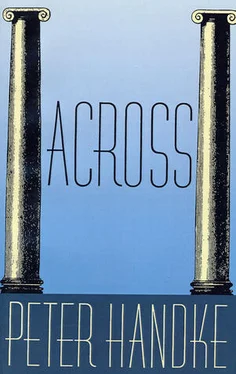Peter Handke - Across
Здесь есть возможность читать онлайн «Peter Handke - Across» весь текст электронной книги совершенно бесплатно (целиком полную версию без сокращений). В некоторых случаях можно слушать аудио, скачать через торрент в формате fb2 и присутствует краткое содержание. Год выпуска: 2000, Издательство: Farrar, Straus and Giroux, Жанр: Современная проза, на английском языке. Описание произведения, (предисловие) а так же отзывы посетителей доступны на портале библиотеки ЛибКат.
- Название:Across
- Автор:
- Издательство:Farrar, Straus and Giroux
- Жанр:
- Год:2000
- ISBN:нет данных
- Рейтинг книги:3 / 5. Голосов: 1
-
Избранное:Добавить в избранное
- Отзывы:
-
Ваша оценка:
- 60
- 1
- 2
- 3
- 4
- 5
Across: краткое содержание, описание и аннотация
Предлагаем к чтению аннотацию, описание, краткое содержание или предисловие (зависит от того, что написал сам автор книги «Across»). Если вы не нашли необходимую информацию о книге — напишите в комментариях, мы постараемся отыскать её.
Across — читать онлайн бесплатно полную книгу (весь текст) целиком
Ниже представлен текст книги, разбитый по страницам. Система сохранения места последней прочитанной страницы, позволяет с удобством читать онлайн бесплатно книгу «Across», без необходимости каждый раз заново искать на чём Вы остановились. Поставьте закладку, и сможете в любой момент перейти на страницу, на которой закончили чтение.
Интервал:
Закладка:
The runner became a pursuer and pursuit meant “action.” No such thought as “I shouldn’t” or “I have no right” entered his head; at the most: “For my own good, I had better …” Perhaps, in spite of everything, I’d have run past him if he hadn’t been standing in the middle of the road. But then the stone was thrown and the enemy lay literally crushed on the ground, as unexpectedly as once in my childhood a rooster which, unintentionally to be sure, I had hit on the head with a pebble thrown from a distance — with the sole difference that the rooster, just as surprisingly, stood up and ran off as if nothing had happened.
I had not thrown blindly, but with wide-open eyes; I had not seen my surroundings but, strangely enough, larger-than-life, my own face. It looked to me neither grimacing nor calm; it looked more like the face of an unknown person, or rather of a hitherto unknown, close relative, who had now at last turned up.
Though I did not regard my adversary as an animal, another incident involving an animal comes to mind. Some children were throwing stones at a cat, saying: “If we hit it, we aimed wrong.” I had not aimed wrong. Even as, still running, I pulled back for the throw, I knew my stone would strike home — and kill.
A wind came up. As so often on this mountain island, the wind was suddenly there, without preceding squalls. It blew in full force, as though its passage through the Bavarian plains had been a buildup and this point on the fringe of the Alps its goal. The sounds of the immediate vicinity, clearly audible only a short moment before, were gone. But the roaring of the wind brought the slightest, most distant noises close. A board fell to the ground. A horse neighed. Someone stood outside a house and laughed. A hammerblow was followed by the clanking of an oil drum. A bell note came from one of the churches on the edge of the city (or in one of the villages beyond). And perhaps that clapping of hands was far outside the city limits.
With great groaning wings a swan, white in the darkness, flew over the mountain. The wind was cold and brought with it a mass of clouds that scudded across the sky with the speed of a spring tide. Briefly, the moon peered out of the advancing veil of mist, and then was seen no more. The swaying trees on the ridge made the strings of lights on the plain below flicker and tremble. The treetops roared like a squadron of planes. Above them, there was not a star to be seen; only a blinking satellite flashed for a moment across a last hole in the clouds. The leaf buds seemed to have blown off the trees, leaving a dead forest of swaying crags; the clumps of mistletoe in the branches were abandoned birds’ nests. The mountain was now inaccessible; and yet, wide open to nature’s grandeur, I thought: This is the world! Together with the beaklike shells of the empty beechnuts above me, the lights on the plain below were its capital city.
I bent over the dying man. He puffed out his cheeks, as though gill-breathing had set in. From his breast pocket emerged, scarcely audible, music from a tiny transistor radio. The man was wearing checked knee socks, and his coat had light-colored patches at the elbows, which reminded me of certain armbands. He seemed elderly; his hair was white. Or could it be that he was really young and had only now, by a speed-up process as in time-lapse photography, become white-haired and wrinkled? I experienced a strange disgust — a kind of sympathy with this man’s disgust at having to die; at having lost his Christian name and being reduced to some sort of “dead Otto” or “dead Erwin.” Then the white-haired man actually made a grimace of extreme revulsion, which spread to me as I bent over him.
With this grimace still on my face, I quickly dragged the body out of the road and up the embankment. At this point the edge of the cliff is near, and I let the dead man fall. I was pulled after him, and for a moment I fell with him.
Sometimes the suicides who jump off this mountain fall through the roofs of houses down below or tear the overhead wires of the bus line. But this side of the mountain did not overlook the city; it surmounted seldom frequented terraces and obscure patches of woods. This incident — I knew while the body was falling — would never be cleared up. My freedom was not threatened. The body would quietly rot. And nevertheless, since I had thrown that stone (of this, too, I was certain), action against me was underway — not a legal proceeding, not an inquest; not a demand for extradition; but — at last I found the word which restored my lucidity — a “challenge.”
Back in the gully, I picked up my projectile, which was still lying there, and with it scraped the unfinished rune off the rock. The stone grew hot in my hand from the friction and smelled like a flint just before the sparks fly. I sat down on a tree root protruding, at the height of a folding chair, from the opposite wall, close to the scene of the crime. At this point, there is a double bend in the road; this gave me a view of a separate section of the rock face, shaped like a truncated pyramid and topped like a ruin with grass and saplings. Here for the moment lay the ruins of a temple in the jungles of Central America. Then in the lamplight the cliff took on the gray coloration of a wasp’s nest, riddled with black cells which seemed abandoned yet alive. The layer of foliage at the foot of the cliff blew back and forth in the storm wind, with eddies, waterspouts, and breakers, and the nest with its black holes changed into a chalk-white oyster bed (the oysters being the shell-shaped stones protruding from the cliff). At the center of the oyster bed, the symbol I had scraped away marked an empty space which, as I saw it, belonged to the cranes, the gulls, and the kingfishers of the silent world. And I experienced a sense of triumph at having killed. I even smacked my lips aloud. This is my history now, I thought. My history will sustain me. Justice had been done, and I belonged to the nation of criminals; no nation is more dispersed and isolated.
It was a big mountain. No blood would flow from the city fountains. No animal would talk. “Everybody off this mountain!” (I shouted that.) Only then did it come to me that I had cursed the dying man in his last moment and hurled the same curse after the corpse as it fell off the cliff. And my obituary was as follows: “At last, you have lost your right to exist!”
At the far end of the gully, a female jogger appeared, not detracting from the emptiness but enhancing it. She was embodied beauty, with blond hair and a jogging suit that glowed fire-hydrant blue in the darkness. In hurrying past, she smiled at the figure sitting on the tree root, and I smiled back. “Marvelous evening, isn’t it?” “Yes, today this gully is eternal.” As she ran, she played with the fingers of her striped gloves as with puppets. Punch and Judy teetered, jumped up, collapsed, flailed out at each other, and hugged, keeping up a dialogue all the while. A spotted cat came running after the jogger, pursued by a single tiny beech leaf scurrying over the ground.
When I stood up, I was so unexpectedly tired that I could hardly move. It wasn’t far to my card game (wasn’t I hours late already?), but I’d never get there. Something drew me off the road, into a nook to sleep in. When at last I moved, it was blindly, with my eyes shut. I didn’t even look when something came panting up behind me (a group of joggers). Blindly I groped my way over the meandering road, as though following the canal down below. When my eyes finally opened, what they saw, looking extraordinarily substantial, were a street sweeper’s twig broom leaning against a gravel box and, as though lit by the brightest sun, the white, granular wall with its lighted windows. “Here I am.” Who said that to whom?
Читать дальшеИнтервал:
Закладка:
Похожие книги на «Across»
Представляем Вашему вниманию похожие книги на «Across» списком для выбора. Мы отобрали схожую по названию и смыслу литературу в надежде предоставить читателям больше вариантов отыскать новые, интересные, ещё непрочитанные произведения.
Обсуждение, отзывы о книге «Across» и просто собственные мнения читателей. Оставьте ваши комментарии, напишите, что Вы думаете о произведении, его смысле или главных героях. Укажите что конкретно понравилось, а что нет, и почему Вы так считаете.












